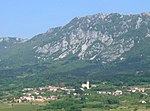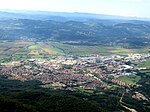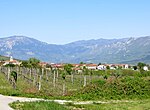Battle of the Frigidus

The Battle of the Frigidus, also called the Battle of the Frigid River, was fought on 5 and 6 September 394 between the armies of the Roman emperor Theodosius the Great and the rebel augustus Eugenius (r. 392–394), in the eastern border of Roman Italy. Theodosius won the battle and defeated the usurpation of Eugenius and Arbogast, restoring unity to the Roman Empire. The battlefield, in the Claustra Alpium Iuliarum near the Julian Alps through which Theodosius's army had passed, was probably in the Vipava Valley – with the Frigidus River being the modern Vipava – or possibly in the valley of the Isonzo. Timasius, the magister militum, commanded the Theodosian army with help from the magister utriusque militiae Stilicho. Arbogast, previously the magister militum under Theodosius's brother-in-law and senior co-emperor Valentinian II (r. 375–392), commanded Eugenius's forces. It was Arbogast who had engineered Eugenius's acclamation after Valentinian's mysterious death. With reinforcements from Theodosius's allies among the Goths led by Alaric and Gainas, and from Bacurius the Iberian, Theodosius's army defeated Eugenius's, and Eugenius was captured and executed. Arbogast killed himself after the battle. The fighting ended the third civil war of Theodosius's reign, after the two fought against Magnus Maximus (r. 383–388). In ecclesiastical history, the battle was remembered as the last to involve an augustus who was a devotee of Roman paganism, though in fact Eugenius was not a pagan. The posthumous accusation of paganism was first levelled by Tyrannius Rufinus to enhance the reputation of Theodosius I, who was a vigorous promoter of Nicene Christianity and the state church of the Roman Empire. Church histories attributed Theodosius's victory at the Frigidus to divine intervention, and Rufinus equated its importance with the Battle of the Milvian Bridge won by Constantine the Great over Maxentius in 312.
Excerpt from the Wikipedia article Battle of the Frigidus (License: CC BY-SA 3.0, Authors, Images).Battle of the Frigidus
Geographical coordinates (GPS) Address Nearby Places Show on map
Geographical coordinates (GPS)
| Latitude | Longitude |
|---|---|
| N 45.870277777778 ° | E 13.936111111111 ° |
Address
5p
5271
Slovenia
Open on Google Maps







